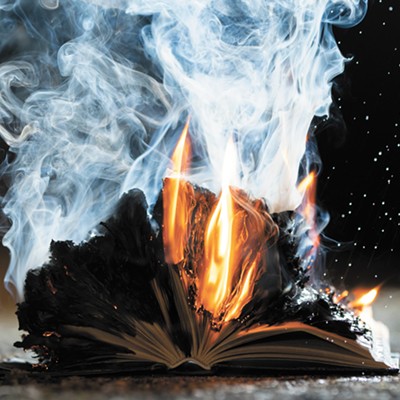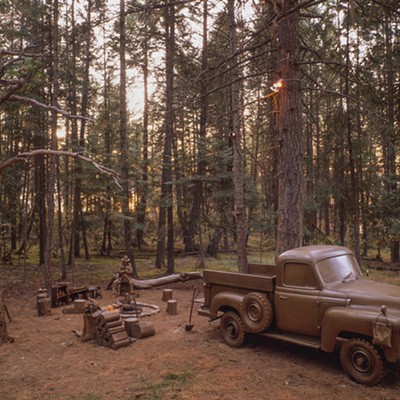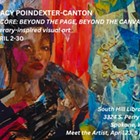People are more than just stereotypes, and good books explode our assumptions about them. Similarly, a look at Spokane’s book-buying habits may adjust your likeliest assumptions: Most book-buyers are women. (True.) Most of them buy fiction. (You’d be surprised.) Everybody just wants mass-market paperbacks of escapist bestsellers. (That’s over at Walmart.) Young adults can barely pay attention to an entire tweet. (They read books too, you know.)
Take the teens and college-age readers who stroll into Lincoln Heights’ used bookstore, 2nd Look Books. Manager Deborah Brooks says that younger readers “are enthusiastic, have a broad range of interests, and like to talk about books.” And they’re not just coming in because of their academic classes.
“To get textbooks,” Brooks says, “usually it’s the mother. But if the kid actually comes in, they’re looking for nonfiction. Biographies, especially if they’re adventures about traveling around, do really well. And young people read the classics, too.”
Don’t get overly impressed: A large portion of 2nd Look’s main floor is still devoted to romances — “Avon, Harlequin, Silhouette,” says Brooks. “Paranormal romances are really popular — anything with vampires. Maybe werewolves, too, I don’t know.”
But readers around here don’t just go with the national flow. Robert Greene, who owns an independent store, BookPeople of Moscow, says that his readers “are a lot less interested in the national books. Those are more focused on the East Coast, on the bright-lights, big-city experience of 20-somethings. People around here are more interested in the natural landscape, in resource usage ... like logging, mining, erosion — things that have some connection to their lives.”
As for the big, flashy, bestselling thrillers, Greene says, “Now you’re getting into some of the problems with the publishing industry today — they’re still stuck in the ‘60s, looking for the next big book about how we beat up the Russians. People here prefer more realism. A lot of these spy novels just don’t appeal to them.”
Greene dismisses mass-market novels by the likes of Danielle Steel and Nora Roberts: “No, we lose all that stuff to Costco and Walmart,” he says.
But while about 60 percent of purchases in his store are made by women, Greene says that “they don’t necessarily buy a lot of fiction.” Instead, he says, “they buy lots of psychology, personal relationships, home crafts, cooking and nutrition. ...”
Real stuff, in other words. Stuff they can use.
Another thing people around here can use is an arsenal of debating points for their right-wing rants. At least that’s the case with one of large chain stores here. At Borders Northpointe, manager Vinnie Snyder says that “history and politics, especially if it’s conservative, does unusually well here — Glenn Beck, [Sean] Hannity. More so than the big fiction titles.” As evidence, he pointed to an overstock of 60 Stieg Larsson titles, waiting to be sold.
Borders has a just-in-time inventory system, and for most titles, Snyder says, “our regional managers monitor our inventory, and they know when a book gets down to just one copy, and we’ll have some copies in the store the next day. But with Glenn Beck, if we have three left, they’ll be gone later that day — and they’ll order, like, 26 more to come in here.”
While most bookstores around here report that women make up about 60 percent of their clientele, Snyder “would push that up to about 70/30. During the day, most shoppers are female. And the guys who come in here? They’re mostly looking for hunting and fishing [books]. Or DVDs.”
Novels, especially fiction by local authors, don’t register on Snyder’s radar: He hadn’t heard of Jess Walter, though “McManus” rang a bell. But in his defense, as he says, “It’s tough to get [Borders managers] to order local stuff here. They have to go through so many layers [of bureaucracy] to get it, and I don’t think their profit margin is that big.”
Local and regional books, however, are among the distinctive features of Spokane’s largest independent bookseller, Auntie’s Bookstore.
“When it’s regional history, we get bigger audiences for readings,” says Lois Hughes, events coordinator at Auntie’s, listing off names like Jack Nisbet, Tony Bamonte and Jane Fritz.
Melissa Opal, a manager with Auntie’s, emphasizes how local bookstores can achieve a personal touch. “We have our staff recommendations, our ‘shelf talkers’ and ‘Auntie’s Picks,’ she says. “Our customers trust us and our staff is passionate. With The Hunger Games [the first book in Suzanne Collins’ dystopian trilogy for the YA audience about child gladiators on reality TV], we’d point it out to them and say, ‘You have to read this.’”
Auntie’s is also going to make a push for younger readers at its new River Park Square store, which opened on Aug. 13.
Opal, who manages Auntie’s at the Square, says the store “will feature more in the way of bestsellers, graphic novels, young-adult titles and movie tie-ins.” With its three-year lease, the mall store offers an opportunity to experiment and be flexible with regard to reader tastes, and here’s what Opal says they’ll experiment with first: “We’ll carry more humor books, Comedy Central stuff. Mixed martial arts will do well here. And we’ll carry some music, for a younger demographic. But during the day, we get more business professionals in the mall, so we’ll carry business books.”
With the mall location, Auntie’s owner Chris O’Harra says, “there is already an association with books” (since Auntie’s has taken over the space from the Children’s Corner Bookstore, the previous tenant). Shoppers want convenience, O’Harra says — to the extent that they want to stroll out of the AMC theaters and be able to pick up a movie’s novel (or novelization) right away. And they certainly aren’t going to venture beyond the skywalks, out into the heat or cold, enduring the four-block walk to Auntie’s mother-ship store.
Unlike, say, pop music, books can sometimes sell steadily for years. Three Cups of Tea, for example — Greg Mortensen’s 2006 account of building schools for girls in Taliban territory — was mentioned by several managers as a strong seller.
“People still come in asking for Jean Auel’s The Clan of the Cave Bear,” O’Harra says. “Sold one just the other day.” That novel, about a Cro-Magnon girl, was first published in 1980.
But decades-long stability is not exactly publishing’s story right now, because Kindles and Nooks and iPads are shouting at the gates.
Sometimes they’re crowding into the bookstores themselves.
Greene, the owner of BookPeople, says that “students have all that equipment now. But among the older crowd, computers mean work.”
Kindle owners, he says, tell him that they’re not buying books anymore. His retort? “I don’t see how people are going to take [electronic devices] to bed and cuddle up with them.”
Over at 2nd Look, Brooks says that Kindle and Nook owners report that they’re “not all that thrilled” with their new devices. “But they probably say that, to us, to make us feel better,” she says, laughing. “I’m an optimist. We’re only a used-book store, and profit margins have never been big. But we’re holding our own.”
2nd Look Books, 29th Ave. and Regal St. Visit 2ndlookbooks.com or call (888) 535-6464. Auntie’s Bookstore, 402 W. Main Ave. Visit auntiesbooks.com or call 838-0206. The new location is on the skywalk level of River Park Square, 808 W. Main St. BookPeople of Moscow, 521 S. Main St., Moscow, Idaho. Visit bookpeople.net or call (208) 882-7957.





















